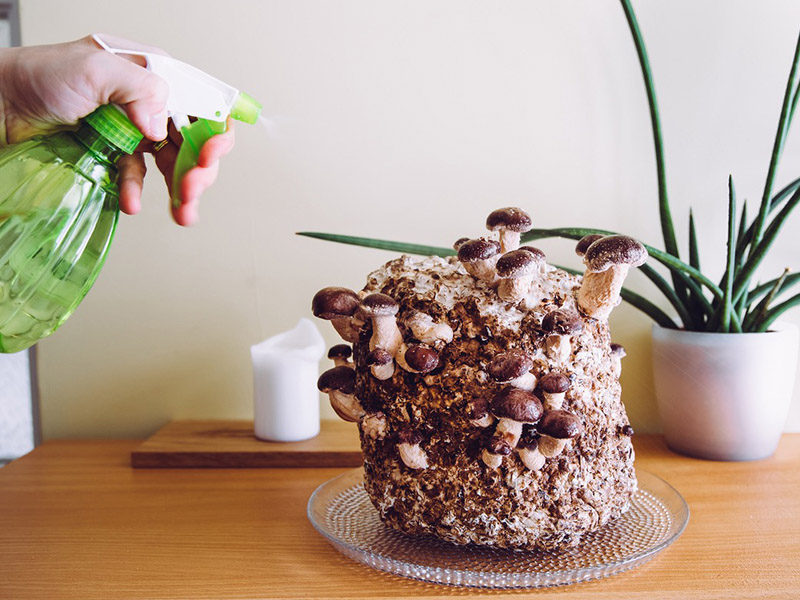Mushrooms require some experience to cultivate successfully. This includes knowing the amount of light and water the plant needs and how to expose them to these elements. Since mushrooms need water to survive, can mushrooms ever drown or be overwatered?
While water is important for the growth and development of mushrooms, water in excess can negatively affect mushroom growth. When watering them, aim to just moisten them. Overwatering your mushrooms could lead to rot, which would cause them to die.

So, how do you water mushrooms without over or under-watering them? When is the best time to water them? How often should you water them? Let’s find out!
Can Mushrooms Be Overwatered?
Yes, you can overwater your mushrooms, but you want to avoid underwatering also. While too much water is not good for the fungi, too little water is not good either. Both of these situations can cause the mushrooms to die.
Mushrooms need a moist and humid environment to survive. Depending upon the variety this spore-bearing fruiting body requires about 80 to 90 percent constant relative humidity levels to survive and reproduce.
What Happens If You Overwater Mushrooms?
When you overwater mushrooms, you expose the fungi to rot, stunting their growth and development. You also prevent them from reproducing and can cause them to die.
But there is a solution if this happens. If you accidentally overwater your mushrooms, you should try to dry out the excess water. You can do this by placing the pot and plant under direct sunlight or a fan.
In my experience, before watering your mushroom, you should know how much water the mushroom needs. You should also remember that a mushroom does not have organs or tissues but comprise mainly of cells. These cells grow by taking in water, so you have to keep them moist for appropriate growth.
The amount of water also affects its quality, appearance, and taste. Besides, the quantity of water determines its level of susceptibility to disease. What’s more, too much water leaves mushrooms open to attack from disease-causing microorganisms.
How Often Should Mushrooms Be Watered?
How often you water your mushrooms depends on the type you are growing. It also depends on the size and mushroom age. For instance, a mature mushroom requires more water than a young mushroom to thrive.
Different mushroom species have different water requirements. Knowing the species’ water requirements will guide you on how much, how often, and when to water.
Mushrooms contain 80%-90% water. To keep an adequate water level and prevent them from drying out, you should water them at least twice daily. You can also water the plant whenever you see if the substrate has gone dry.
A moist environment is necessary for mushrooms to grow, meaning you have to ensure they do not lack water. When water is inadequate, they dry out and die.
So, does this mean you cannot skip watering your mushrooms for a day? No, skipping watering for a day would not cause irreparable damage to this fungus, but making it a habit would make them dry out.
Once they dry out, it becomes difficult for them to absorb and hold water like they used to. This in turn would give this fungus an awkward taste and appearance.
Water Sources You Should Avoid
Tap water
It is not advisable to water your mushroom with tap water. Tap water contains chemicals like chlorine which help purify it. These chemicals help rid the water of harmful microorganisms like fungi and bacteria. While these chemicals help keep drinking water safe, it’s not the same for the mushroom, which is a fungus.
Water Bodies
You should also avoid using water from water bodies on your mushroom. Waterbodies, in this case, include lakes, ponds, rivers, and streams.
These water bodies often contain toxins and heavy metals that might harm the health of your mushrooms and you, defeating the whole purpose of growing mushrooms to eat healthily. These chemicals enter water bodies from industries that release waste into oceans and sometimes from farms that use heavy chemicals like pesticides and herbicides.
Roof water
Avoid using rainwater collected from your roof to water your mushroom. In my experience, rainwater collected from the roof often contains harmful elements like chemicals, dust, and even bird droppings, which can hurt your mushrooms’ health.
With the above information, you already know the water sources to avoid when watering your plants. Now, do you want to know the water source that is best to use? Keep reading.
Ideal Water Sources
Spring water
Spring water is water purified naturally by passing through rocks. This type of water contains the right kind of elements necessary for the proper growth and development of mushrooms. Since it might be difficult to get spring water directly from the source, another great option is the bottled one.
Filtered water
Filtered water or reverse osmosis water from your home is ideal for watering mushrooms. It’s also a less expensive source than spring water, especially as your mushroom farm grows.
Rainwater
Collected rainwater is another alternative you can use to water your mushroom. When I mean rainwater, you should know that this does not include the one collected from your roof. You have to collect this rainwater directly to use it in watering your mushroom. As I stated earlier, roof rainwater could contain impurities harmful to mushrooms’ health.
While knowing the best water source for your mushrooms is good, wrongly applying water from the right source would also defeat the whole process. So next, I’ll review the best way to apply water to your mushroom so it can develop and grow well.
Steps On How To Water Your Mushrooms
- Get a clean spray bottle
- Fill the bottle with clean water.
- Spray the water on and under the mushroom to ensure it receives enough moisture.
- Ensure the water reaches the fungus roots within the soil or any other medium you use. You can do this by spraying the soil or medium with water too. Keep in mind that when the substrate moisture content is less than ideal, it will hinder the growth of the mushroom.
Final Thoughts
As I mentioned above, mushroom cells contain 90% water, and for them to grow, they need to absorb lots of water. In other words, how you water them determines how they will grow. Remember to keep the substrate moist and you’ll have many successful mushroom harvests to enjoy!
Related Posts
